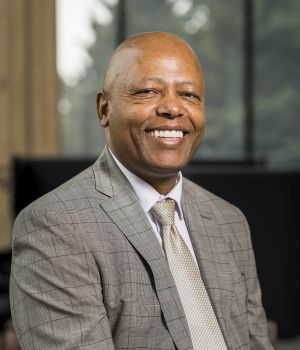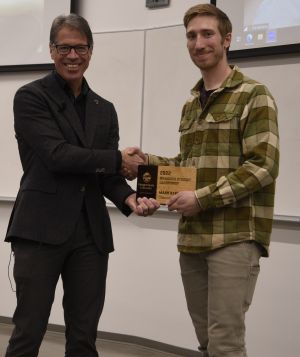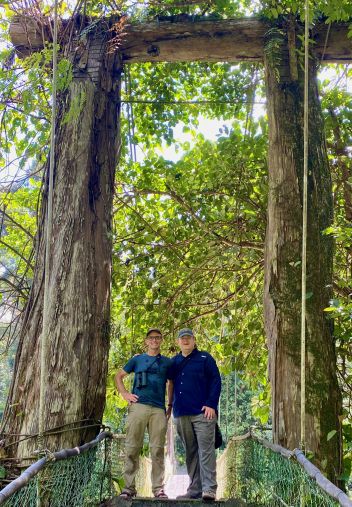
Mark Swanson has been hired as an Associate Professor of Family Forestry and Starker Chair in the Forest Engineering, Resources and Management department (FERM).
Tell us about your background – what drew you to your specialty area?
During my undergraduate years at the University of Washington (1995-1999), and in graduate school at the same institution (2000-2007), I got to meet and study with some amazing forest scientists, including Jerry Franklin. Jerry and a number of his colleagues gave me opportunities to work on long-term forest research with permanent sample plots, and that interest has stayed with me. In addition, I got to meet and learn from people in the private forestry world, with Steve Stinson and the rest of the Stinson family (of Toledo, Washington) being real mentors, particularly with respect to family landowner needs and approaches. Later, after I had moved to the Palouse to work as a professor of silviculture and ecology at Washington State University, I was mentored by Harold Osborne (professor emeritus, University of Idaho) on a range of topics, including small-scale logging and prescribed fire. I like to think I am part of the legacy of people like Jerry, Steve, and Harold in promoting multiple-value forestry on a range of ownerships.
Where did you grow up/go to school?
My parents both served in the U.S. Air Force, and until I was ten years old, we moved around to follow my father’s military postings. From age ten until I graduated from high school, we were in the San Francisco Bay Area, where I headed to the Santa Cruz Mountains at every opportunity to run around in the chaparral, oak woodlands, and forests. I then left as a college freshman for Seattle, where I studied at the College of Forest Resources (now the School of Environmental and Forest Sciences).
What courses do you teach / labs do you lead?
At Washington State University, I taught a range of courses at different times, including silviculture, forest plants and ecosystems, arid lands and ecosystems, landscape ecology, disturbance ecology, wildland fire ecology and management, practice in forestry consulting and stewardship, and more. This really helped me grow as a professional. I will have a much smaller teaching load at Oregon State, where I will teach a course in forest measurements during fall semester, and possibly the occasional seminar course. My extension appointment, I think, will ensure that my teaching on a range of topics remains current and (hopefully) engaging!
What brought you to the College of Forestry?
The offer to take up a well-respected position like the Starker Chair alone is a powerful motivation (and a great responsibility)! I appreciate families like the Starkers supporting the mission here. And there is a lot more that made the CoF attractive to me, like being closer to long-time colleagues (Meg Krawchuk, Jim Rivers, Matt Betts, to name a few). FERM, with Jeff Hatten at the helm, is a great unit. The leadership of people like Tom DeLuca, Cristina Eisenberg, Holly Ober, Katy Kavanagh, and the rest of the Dean’s Office also gives me great confidence in the course of the College. And just belonging to a world-renowned forestry institution, a real flagship for teaching and research, is a tremendous attraction.
What are your favorite hobbies?
I love rock climbing, trail running, chasing deer and elk around (they usually win), birding, reading (military history, nature writing, and much more), travel with my wife, and enjoying the diversity of beer, wine, and food from the Pacific Northwest. With some of my work involving botany, I also am a true “plant nerd”, and I really enjoy learning new plant taxa.
What are you reading or watching right now?
I am re-reading some of Aldo Leopold’s essays in a compendium called “The River of the Mother of God”, which I highly recommend to people in the natural resources. Also, I am reading Admiral Dan Barbey’s memoirs on the Seventh Amphibious Force in the Pacific “island-hopping” campaign of WW2. My great-uncle Allen Gibbs fought with the US Army in New Guinea during that war, and reading books like that bring me a little closer to his life. And finally, because I can never just focus on a few books, I’m working through Kirkman and Jack (2021), “Ecological Restoration and Management of Longleaf Pine Forests”, an excellent edited book with a lot of lessons for those of us out west who work in ponderosa pine.
Anything else you’d like to share?
I am really excited to serve Oregon State University, and the people of Oregon and the broader Northwest, as a teacher, researcher, extension professional, and member of the faculty here. I want to thank everyone for the warm welcome.














